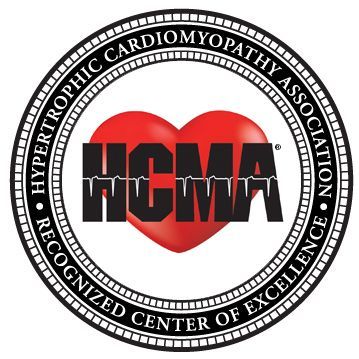
Have you ever wondered what a Center of Excellence (COE) is? A COE is a dream team of specialists who work together to provide top-notch care to patients with specific diseases. They follow the best, most up-to-date practices. Many medical facilities strive to become a COE by forming a dedicated team that focuses on treating diseases like Cancer, Diabetes, Alzheimer’s, and our main focus, HCM.
In 2004, the HCMA launched the “HCMA Recognized Centers of Excellence” program. This program plays a pivotal role in ensuring that the services and procedures offered at recognized COEs align with the latest best practices for managing patients with HCM. These centers use a team-based approach to care, involving HCM specialist cardiologists, genetic counselors, imaging specialists, and more. A COE has state-of-the-art facilities, scanning protocols, and well-trained technicians.
Our hard work has paid off! The American Heart Association and the American College of Cardiologists have embraced the HCMA’s care model in their best practice guidelines for HCM, 2020/2024.
Why consider seeking care at a COE?
Because it matters! In the USA, most community cardiologists typically encounter around 5-10 cases of HCM in their practice. HCM is an incredibly diverse disease. These cardiologists may not be fully familiar with the intricate variations of HCM anatomy, such as the varying degrees and locations of thickening in the heart, which can impact heart function. A COE program may have experience with hundreds or even thousands of HCM cases, making them much more likely to understand your specific presentation of HCM. COEs are often located within large medical centers with top-quality, up-to-date equipment.
If you need invasive treatment for obstruction, such as myectomy surgery or alcohol septal ablation, it’s crucial to seek care at a high-volume center. Even at a COE, it’s vital to ask about the frequency of these procedures performed by your potential surgeon. The statistics overwhelmingly indicate that surgeons performing a higher volume of these specialized procedures are associated with significantly lower rates of complications. So, to make sure your surgery goes as smoothly as possible, we highly recommend consulting with a high-volume COE (which can be arranged via telemedicine in some instances) before consenting to a procedure.
For a deeper understanding of the contrast between myectomy in a high-volume center and lower-volume hospitals, we encourage you to explore “Septal Reduction Therapy for Obstructive Hypertrophic Cardiomyopathy: Volume Still Matters for Septal Myectomy” in the Journal of the American Heart Association, Volume 12, Number 10, published on 15 May 2023.
Seeking COE care?
Discover a list of recognized centers by visiting our website at https://4hcm.org/center-of-excellence/. Be sure to use the phone number on our website to reach the COE team directly. We want to make sure you see the HCM experts and not just any cardiologists at a large medical center! While our recognition currently extends to COEs in the United States, we are here to assist if you are looking for recommendations in other countries. Simply reach out to us for more information. We’re committed to expanding and evaluating new programs for COE status. We want to ensure that you can access COE care near your home.
Knowing that access to care can be challenging, we offer need-based travel grants to help individuals receive the best care for HCM. Contact us at +1 973-983-7429 and inquire about the Lori Fund , or apply directly on our website. The Lori Fund reimburses you for eligible gas, airfare, hotel accommodations, and food expenses, offering up to $600 annually to support your journey to a Center of Excellence.
We’ve also teamed up with Angel Flight East to facilitate patients’ travel to a COE for care. Even if you are not in the Eastern US, their network can help connect you with another regional Angel Flight partner. Find out more at https://angelflighteast.org/ or call us, and we will gladly assist you in connecting with a suitable flight.
We are excited about helping you access exceptional COE care for HCM. Please don’t hesitate to contact us for any support, guidance, or information you may need on your journey toward receiving the best possible care.
There needs to be more clarity about exercise for HCM patients. Some doctors say, “don’t do anything physical,” and others say, “do whatever you want.” We can likely agree on one thing – they’re both wrong, and the best advice is somewhere in the middle.
Experts agree that exercise is healthy for people with HCM. Depending on symptoms, most people with HCM can safely do light exercise like walking.
Those with HCM who have no symptoms may be able to exercise without restrictions.
Most people with symptomatic HCM aren’t advised to do heavy exercise. It’s best to avoid intense activity that involves bursts of sprinting, heavy weightlifting, or contact sports like football.
- Research indicates that intense physical activity predisposes susceptible people with HCM to arrhythmias and possibly sudden death.
- The LIVE-HCM study results found that for most with HCM self-reporting for the study, vigorous exercise did not raise the risk of serious cardiovascular events such as dangerous arrhythmia, appropriate ICD shock, or sudden cardiac arrest.
- More research into this topic is ongoing, so we will know more soon.
Fast Facts About Exercising When You Have HCM:
- For most patients, HCM doesn’t interfere too much with their lifestyle.
- HCM patients should not lead a sedentary lifestyle.
- Walking, bicycling, lap swimming, and similar activities are generally safe forms of exercise. If swimming, be sure there is a lifeguard or have a buddy.
- Those with symptoms should not overexert themselves.
- Listen to your body and slow down or stop if your symptoms increase.
- When exercising, avoid being in extreme temperatures and stay hydrated.
- If you want to join a gym, be familiar with the safety laws in your state.
- Are gyms required to have automated external defibrillators (AEDs)?
- Work with your HCM specialist to find the best activity level for you.
An HCM specialist and team created a helpful approach to fitness at the Peter Munk Cardiac Centre in Toronto, Canada. This program has three fitness levels. Their website shows you how to maintain heart health through videos, medical information, and a proven exercise program. https://hearthealthbydesign.com/.
The post July is about COE Care at the HCMA! appeared first on Hypertrophic Cardiomyopathy Association.
HCMA Blog


 Translate
Translate